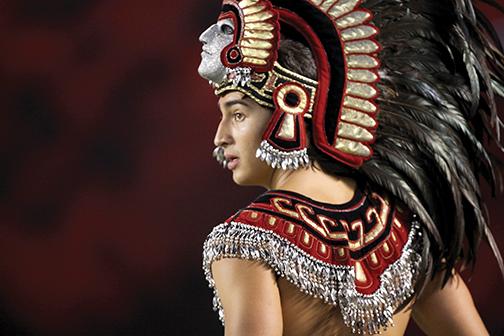
I’ve never been much of a sports guy.
If anything, I try to keep my San Diego State game visits to a minimum. But even I can’t deny the few times I do go to games, there’s something inherently special about our student body exhibiting pride when we, old and young, collectively cheer on the Aztec Warrior as he rallies us together.
There are some, however, who disagree with the existence of this symbol.
The Aztec Warrior has become the center of controversy under allegations in another petition to Associated Students that the mascot displays levels of “disrespect and dehumanization of native cultures” and perpetrates racist perceptions of Native Americans as “savage” and “uncivilized.”
This ridiculous argument to eradicate our school mascot, the Aztec Warrior, in the name of combating racism ridicules social justice movements. It disrespects the unified culture of our school and the roots Aztec (or Nahuatl) culture has in San Diego, while making broad assumptions about the context of our mascot and how indigenous people should feel about it.
The argument that the Aztec Warrior is culturally insensitive is not as clear-cut as people think, especially if we gloss over the controversies of the past.
The Aztec Warrior, for many of us, is much more than a college sports mascot. When we cheer for him we cheer for something bigger than us. He’s a symbol of a larger identity and unifying culture we have here at SDSU that transcends age, race, gender and other factions that tend to divide us.
It was a controversy of the same nature that officially killed Monty Montezuma in 2001 and left SDSU being the only division I program without a mascot. In 2003, in response to allegations of racism, 83 percent of SDSU students and faculty overwhelmingly voted for an Aztec Warrior design that distanced itself from the cartoonish and offensive antics of yesteryear and moved toward the historically accurate, loin-cloth-wearing Aztec Warrior we know today.
What didn’t get much attention throughout the correction of the inappropriate themes associated with the old mascot was the extensive measures made on behalf of SDSU. This campus spent approximately $100,000 toward the removal of the imagery, the creation of committees to debate the issue, and the creation of a new mascot in consultation with multiple Aztec scholars in the United States and Mexico. By consulting Aztec scholars, the current mascot honors Aztec culture instead of deriding it.
This decision was a result of former SDSU president Stephen Weber, who had read more than a dozen texts on Aztec culture and Aztec identity politics. The revision and reinstatement of the new mascot was made in hopes that our sports teams would immortalize the achievements, tenacity and battlefield heroics of the Aztecs through their actions.
So what’s the complaint this time?
The fact is Americans today strive to be excessively politically correct when it comes to racial issues and injustices, and it’s ruining things as simple and innocent as school pride.
Even Clarence Thomas, who is famously known as the second African American to serve on U.S. Supreme Court, said, “My sadness is that we are more race and difference conscious than I was in the 1960s … name a day when (race issues) doesn’t come up. Everybody is sensitive.”
We’ve seen similar cases reflected in other sports teams’ names across the nation. A golden example is the controversy surrounding the usage of the word “redskin” in teams such as the Washington Redskins.
While we are quick to assume that all Native Americans are immediately offended by the usage of the term redskins, we have to know that such generalizations hurt the cause. In a survey conducted in 2004, 90 percent of Native Americans reported not being offended by the term. Many feel like there are more pressing issues, such as Native American welfare, to be concerned with.
Robert “Two Eagles” Greene, a longtime chief of the Virginia-based Patawomek tribe, has openly stated he would conversely be offended if the Washington Redskins were to change their name to something else.
“Was the comment made to denigrate Indian people?” he asked. “I don’t think so … I think that sometimes, we’re a little too touchy in our society these days.”
The same applies to the Aztecs. At the state in which we glorify the Aztec Warrior and celebrate Aztec pride, it’s hard to find a reason to justify the argument that the usage of the Aztec Warrior marginalizes those of Aztec descent and culture as subordinate and inferior.
The only way I would take this argument seriously is if the mascot held the same derogative imagery as referred by “black-face,” or if the term “Aztec” held the same gravitas as the n-word.
The other argument regarding the mascot’s promotion of a savage-like perception of indigenous people also is one that fails in logic. Unruly behavior is not exclusive to our mascot only. All mascots, from the SDSU Aztec Warrior to the Oregon Ducks, are supposed to display aggressive behavior at sports games to rally school pride.
As a symbol that unites students of diverse backgrounds, it’s absurd to call for the end of the Aztec Warrior on the assumption that it racially marginalizes. Symbols, like the Aztec Warrior, serve a larger purpose and it’s the reason we yell and scream at games. Regardless of what class, race, age, sex, religion, or sexual orientation, we’re all Aztecs for life. If a mascot can make a sports cynic like me feel that unity, isn’t it worth protecting?
Update: Read about the history of the mascot and the opposing argument.











